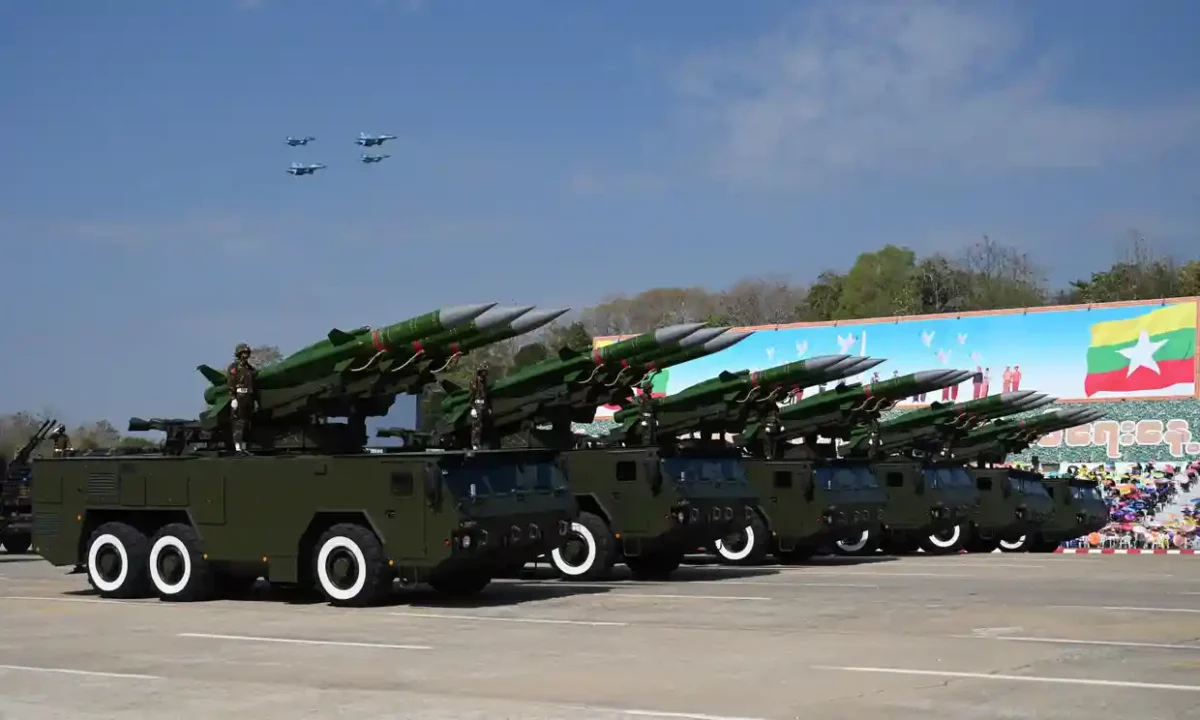Coverage of SAC-M’s report Fatal Business: Supplying the Myanmar Military’s Weapon Production in the Guardian.
Independent experts find western-supplied materials are still finding their way into military’s hands
16 January 2023
Companies in 13 countries across Europe, Asia and North America are assisting Myanmar’s junta – either indirectly or directly – by supplying materials to the stated-owned entity that produces the military’s weapons, a report by the Special Advisory Council for Myanmar (SAC-M) has found.
The weapons are then being used to commit human rights atrocities.
The military forcibly took control of Myanmar in February 2021. It has since killed more than 2,730 people and arrested more than 17,200 in an attempt to eradicate resistance. Reports of airstrikes, villages being burned down and children being tortured have become synonymous with the junta, which faces a genocide investigation by the international court of justice.
“The fact that weapons used in … attacks have links to countries who are claiming ‘impartiality’ in the face of brutal and widespread repression of democratic aspirations is simply scandalous,” said Dr Gerard McCarthy, an assistant professor at the International Institute of Social Studies, who specialises in the politics of welfare and development in south-east Asia.
The report by the SAC-M found – through interviews and analysis of shipping records and leaked documents – that dozens of companies based in Austria, France, China, Singapore, India, Israel, Ukraine, Germany, Taiwan, Japan, Russia, South Korea and the US were supplying raw materials, machines, technology and parts to the Directorate of Defence Industries (DDI), a state-owned company responsible for producing military equipment for Myanmar’s armed forces.
“It’s more or less a military-owned enterprise,” said Yanghee Lee, a former UN special rapporteur on the human rights situation in Myanmar and founder of the SAC-M, which is a group of independent experts, including former UN officials, who came together after the coup to advocate on behalf of the democratic movement in the country.
She added that the DDI could use these imported supplies “to suppress and commit human rights violations, war crimes, crimes against humanity and genocide”.
The SAC-M called on the companies, whether directly or indirectly doing business with the military and associated entities, to stop.
Among those, the Austrian company GFM Steyr is believed to have provided computer numerical control machines for the manufacturing of gun barrels. Dassault Systèmes in France is said to have supplied 3D electromagnetic simulation and analysis software, and computer aided design (CAD) software for 3D modelling. The Germany-based Siemens Digital Industries Software is thought to have provided multiple types of software, and Ukraine’s Ukrspecexport is believed to have supplied types of transfer technology for the production of 2SIU self-propelled howitzers, BTR-4 armoured personnel carriers and MMT-40 light tanks.
Lee said that if these companies were not doing business directly with the DDI, they should investigate how their products had inadvertently ended up being used for the manufacturing of arms by the military in Myanmar.
The companies referred to above did not respond to requests for comment.
Countries also have a role in ensuring their companies are not inadvertently facilitating human rights violations, according to the report. “Failing to do so makes them complicit in the Myanmar military’s barbaric crimes,” Lee said.
“The hypocrisy here is mammoth,” McCarthy said. Myanmar’s democratically elected National Unity government had been “stonewalled internationally” in its attempts to procure defence capabilities, he said. “Yet many of the same countries claiming not to want to ‘intervene’ in Myanmar are turning a blind eye to their own companies directly and indirectly arming the dictatorship.”
Austria’s ministry of labour and economy said it had not issued export licences to the defence industry in recent years and had “no knowledge” of deliveries of military items or dual-use goods to Myanmar from Austrian companies.
A spokesperson at Singapore’s ministry of foreign affairs said it did not authorise the transfer of arms or items with potential military application to Myanmar.
“In addition, Singapore submits reports to the UN register of conventional arms on international arms transfers every year,” the spokesperson said, adding that the register did not include Myanmar.
“We will not hesitate to take action against those who contravene our laws.”


